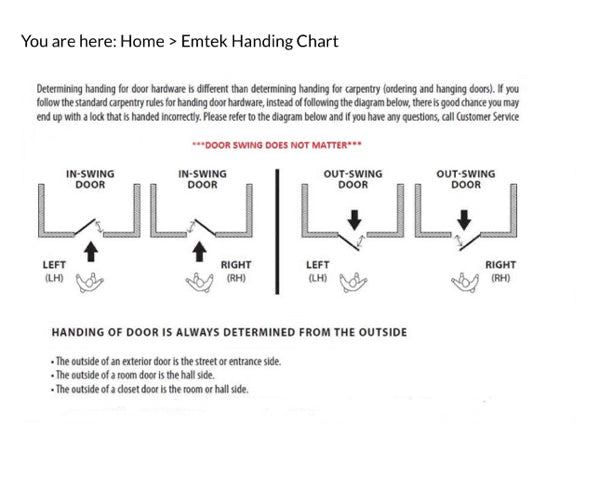Tips for Choosing the Right Door Lock
Getting the right door lock for your home or business is really important, and isn’t a process that should be rushed into without first having given it undue consideration. Here are some tips to ensure you choose the right door locks for your needs:
Understand lock terminology:
Most deadbolts (whether conventional or smart) are single-cylinder and usually operated using a key from the outside or a thumb-turn from inside. High security locks have hardened cylinders, unique pin configurations, and other forms of defense. Grade 1 locks are the most difficult to disable, while rankings go up to level 3, but you’ll probably need to check with a professional, qualified locksmith before purchasing a lock, as most don’t display the grade on the packaging.
Think about how much you want to spend:
While most high-security locks aren’t cheap, the costs and loss of money associated with a break-in will usually be far higher, making buying a high-security lock a sound investment. Note that homeowner’s insurance policies often give discounts for homes with deadbolts, too.
Ask yourself if you want a smart lock?
While a little costlier than standard locks, smart locks do have a number of advantages, not least that they can prove helpful if you’re prone to often leaving your door unlocked accidentally, or if you need to allow contractors or cleaners entry to your home when you’re not there. When you link up your smart lock with your mobile device via an app, you can remotely lock and unlock your door. Note that this kind of remote access usually requires a Wi-Fi bridge, at an additional cost.
Do you require remote access? If not, an electronic lock might be an option:
Electronic locks offer keypad access to your home or business, and give you the option of distributing pin codes among individuals with whom you wish to gain entry in your absence. These are not compatible with smart devices though.
Check that your doorframe and lock are strong enough:
If your doors are hollow-core, then there’s every chance that they’ll give way in the event of unlawful entry, long before your lock does. There’s little point paying for a high security lock, if the door it’s installed in is weak and penetrable.
When you buy the lock of your choice, ensure that a heavy-duty metal box strike is installed, or opt for 3-inch screws to be added to your existing strike plate. Think about your door hinges, too, and ensure that they’re secure enough.
To be certain that your doorframe, hinges and lock are strong enough to stand up to an attack from a burglar or intruder, consult with a professional locksmith, who will be happy to perform a security assessment on your home or business before you take any action to replace or upgrade any locks.
Ultimately, if you choose to spend less on locks, that’s entirely your prerogative, but cutting costs on something as important as security, is not something any lock specialist or security professional would recommend. Buying high-security locks affords you peace of mind, and prevents you from having to count the cost of not having a secure home or business.
Understand lock terminology:
Most deadbolts (whether conventional or smart) are single-cylinder and usually operated using a key from the outside or a thumb-turn from inside. High security locks have hardened cylinders, unique pin configurations, and other forms of defense. Grade 1 locks are the most difficult to disable, while rankings go up to level 3, but you’ll probably need to check with a professional, qualified locksmith before purchasing a lock, as most don’t display the grade on the packaging.
Think about how much you want to spend:
While most high-security locks aren’t cheap, the costs and loss of money associated with a break-in will usually be far higher, making buying a high-security lock a sound investment. Note that homeowner’s insurance policies often give discounts for homes with deadbolts, too.
Ask yourself if you want a smart lock?
While a little costlier than standard locks, smart locks do have a number of advantages, not least that they can prove helpful if you’re prone to often leaving your door unlocked accidentally, or if you need to allow contractors or cleaners entry to your home when you’re not there. When you link up your smart lock with your mobile device via an app, you can remotely lock and unlock your door. Note that this kind of remote access usually requires a Wi-Fi bridge, at an additional cost.
Do you require remote access? If not, an electronic lock might be an option:
Electronic locks offer keypad access to your home or business, and give you the option of distributing pin codes among individuals with whom you wish to gain entry in your absence. These are not compatible with smart devices though.
Check that your doorframe and lock are strong enough:
If your doors are hollow-core, then there’s every chance that they’ll give way in the event of unlawful entry, long before your lock does. There’s little point paying for a high security lock, if the door it’s installed in is weak and penetrable.
When you buy the lock of your choice, ensure that a heavy-duty metal box strike is installed, or opt for 3-inch screws to be added to your existing strike plate. Think about your door hinges, too, and ensure that they’re secure enough.
To be certain that your doorframe, hinges and lock are strong enough to stand up to an attack from a burglar or intruder, consult with a professional locksmith, who will be happy to perform a security assessment on your home or business before you take any action to replace or upgrade any locks.
Ultimately, if you choose to spend less on locks, that’s entirely your prerogative, but cutting costs on something as important as security, is not something any lock specialist or security professional would recommend. Buying high-security locks affords you peace of mind, and prevents you from having to count the cost of not having a secure home or business.

